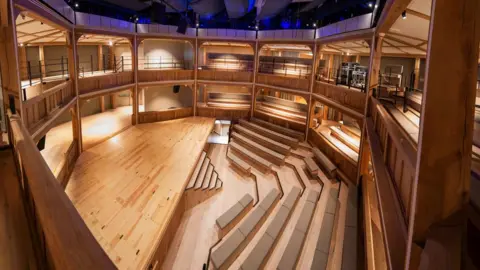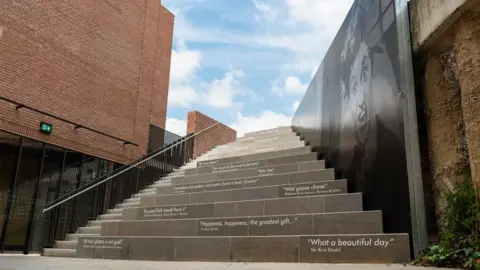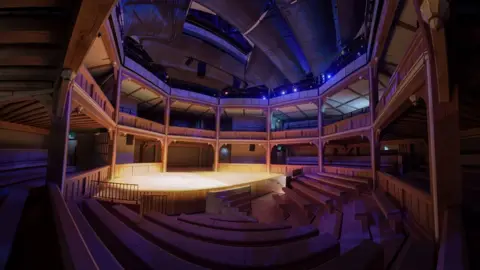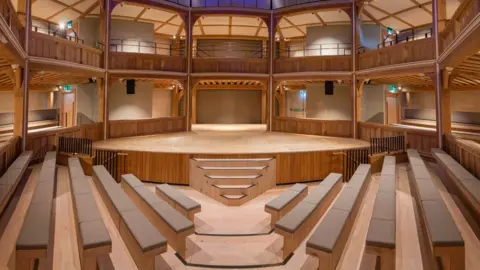Shakespeare North unveils rival to London's Globe Theatre
 Andrew Brooks
Andrew BrooksOnce famed for making watches and cables, the town of Prescot near Liverpool is staging a Shakespearean reinvention.
The north of England now has a rival to London's Globe Theatre, celebrating Prescot's links to Shakespeare.
A £38m replica of the Royal Cockpit theatre is opening its doors on Friday.
The wooden auditorium recaptures the look and atmosphere of a venue that was originally sited where 10 Downing Street now stands.
A journey down Eccleston Street in Prescot takes you past a Jacobean half-timbered frontage; Stone Street, at 71cm wide, Britain's second narrowest street; the Lord Strange pub, with its pictures of Shakespeare; and ends at a Brazilian waxing salon.
 Andrew Brooks
Andrew BrooksBehind it is a small red plaque that reveals this was the site of what is claimed to be the only indoor, purpose-built, freestanding Elizabethan playhouse outside London.
It was built on the edge of land owned by the Earls of Derby, an aristocratic family with a long history of links to the theatre.
Lord Strange in the late 1500s had his own troupe of actors, many of whom worked with Shakespeare.
Blood sports and drama
More than 400 years later, this playhouse and the town's links with Shakespeare have inspired the creation of a new theatre that replicates a venue that originally began as a place for Henry VIII to stage cockfights.
It was part of the Palace of Whitehall and is today the site of the Cabinet Office and the rear of 10 Downing Street. The Cockpit-in-Court or Royal Cockpit then grew to become a theatre and part of Shakespearean London.
 Andrew Brooks
Andrew BrooksOne disputed claim is that it was where the Tempest was first staged. What does make it stand out is how much we know about its design. There are even accurate drawings of its interior which were made in the 1600s.
Architect Nicholas Helm says he feels Prescot's new version "is the only really accurate replica of a Shakespearean theatre".
The Globe, on London's Southbank, he says, involved some "guesswork".
This, he feels, is "the closest we've got to the real experience".
Lord Strange's Men
The idea for the theatre grew out of a project to try to reflect Shakespeare's connections to the north.
One proposal was to build in Preston, which was the location of a highly contested theory that part of Shakespeare's "lost years" in his youth were spent in Lancashire.
The idea to switch to Prescot, near St Helens, grew out of a plan that began with Liverpool Capital of Culture.
The lost Elizabethan Playhouse in Prescot was the inspiration to try to create a lasting legacy in what is Britain's second-most deprived local authority area.
 Andrew Brooks
Andrew BrooksOne of those who has spent 18 years working on the project is Prof Elspeth Graham of Liverpool John Moores University.
One of the key links was the man who now has a pub named after him, Lord Strange.
"Ferdinando Stanley, Lord Strange, the fifth Earl of Derby, was the patron of an important company of players called Strange's Men," she said.
"The core of Strange's Men, almost certainly including Shakespeare, went on to form the Lord Chamberlain's Men, Shakespeare's company at the Globe.
"But Shakespeare North is also intended to commemorate the surprising, broader, theatrical culture of Prescot and Knowsley in the late 16th and the 17th Centuries."
No screws or glue
From the outside, it is brick-built modernity. But when you walk inside, you are hit by the smell of wood. Screens and balconies, built by the team behind the Globe in London, surround the stage to recreate what Helm describes as a "theatrical laboratory".
Its construction follows the process of the Elizabethan era - there are no screws or glue holding the buildings warm wooden interior together.
But it is not just the look they are trying to emulate. The theatre wants to revive a little of the atmosphere of an Elizabethan audience.
"Elizabethan audiences were rather more rowdy than today's," said Siobhan Noble, one of the team running the new theatre, who wants to create a place that feels inviting to the local community.
There will be no frowning on walking in and out.
"We want it to be informal, relaxed."
It has taken nearly 20 years to get the project off the ground - the next challenge is to build an audience.
